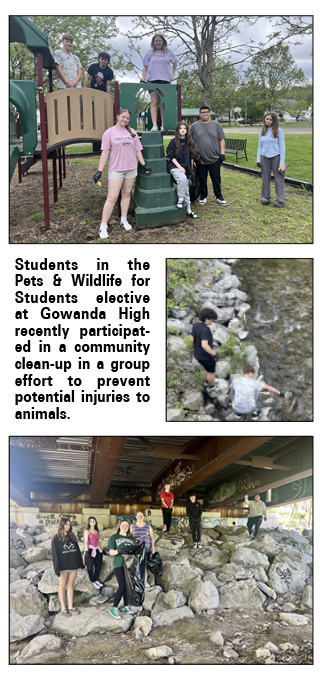PAWS-ing to eliminate risks to wildlife

GOWANDA – Students in the Pets & Wildlife for Students elective at Gowanda High in May spent a few days learning about the impact of trash on wildlife and participated in a community clean-up in a group effort to prevent potential injuries to animals.
They not only properly disposed of some possible hazards to area wildlife, but also united to help beautify some public spaces in the community.
Under the guidance of teacher Mrs. Holly Klink, the group spent a recent 12th-period class gathering and properly disposing of litter at St. John Park and Cattaraugus Creek near the bridge off Panther Drive.
Copious amounts of carelessly discarded cigarette butts, plastic cups, aluminum cans and pencils were picked up on their group’s walk from the school to the playground. They filled more than half of an industrial-size garbage bag with the detritus.
Afterward, they discussed the impact of trash on wildlife in the classroom with Ms. Klink, and went over these points:
— Ingestion: Wildlife may ingest garbage, leading to choking, blocked airways, or starvation. Food scraps in garbage attract animals, potentially creating food-dependent behaviors and disrupting natural diets. Plastic bags, balloons, and other materials can be swallowed by animals, causing digestive issues — and even death.
— Entanglement: Animals can become entangled in trash, such as plastic bags, fishing hooks, or fishing line, hindering their movement and causing injury or death. It can lead to drowning, strangulation, or wounds.
— Habitat degradation: Trash can contaminate water sources, making them unsafe for wildlife to drink from. Litter can alter natural behaviors and attract unwanted animals, negatively impacting other species. Some types of trash – such as plastic – take decades to decompose, posing a long-term threat to wildlife.
— Examples of harmful trash: Plastic bags, fishing gear, balloons, Styrofoam, and cigarette butts.
— How to help: Proper waste disposal, recycling and reusing, cleaning up trash, and educating others.
Questions about PAWS? Please reach out to msklink@gcslearn.org.
